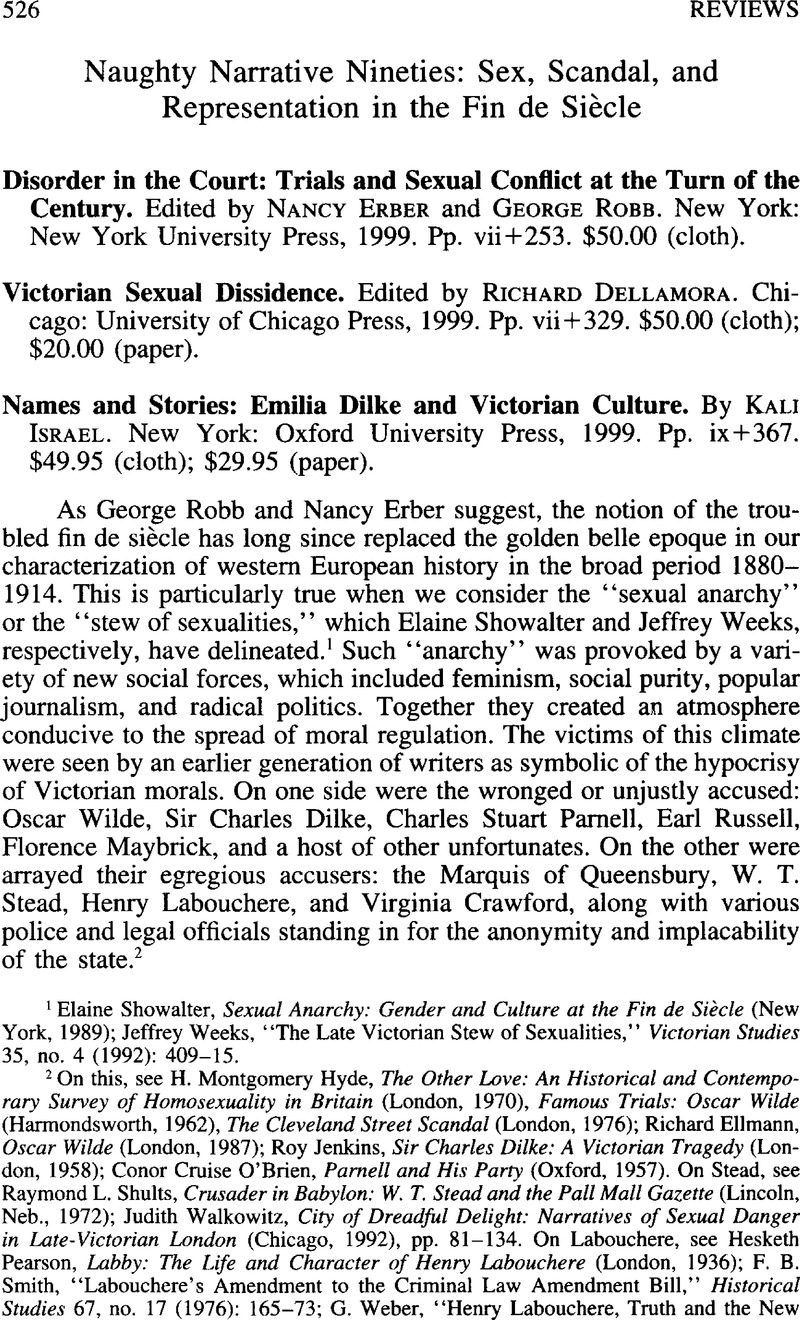Article contents
Naughty Narrative Nineties: Sex, Scandal, and Representation in the Fin de Siècle - Disorder in the Court: Trials and Sexual Conflict at the Turn of the Century. Edited by Nancy Erber and George Robb. New York: New York University Press, 1999. Pp. vii+253. $50.00 (cloth). - Victorian Sexual Dissidence. Edited by Richard Dellamora. Chicago: University of Chicago Press, 1999. Pp. vii+329. $50.00 (cloth); $20.00 (paper). - Names and Stories: Emilia Dilke and Victorian Culture. By Kali Israel. New York: Oxford University Press, 1999. Pp. ix+367. $49.95 (cloth); $29.95 (paper).
Published online by Cambridge University Press: 10 May 2013
Abstract

- Type
- Reviews
- Information
- Copyright
- Copyright © North American Conference of British Studies 2002
References
1 Showalter, Elaine, Sexual Anarchy: Gender and Culture at the Fin de Siecle (New York, 1989)Google Scholar; Weeks, Jeffrey, “The Late Victorian Stew of Sexualities,” Victorian Studies 35, no. 4 (1992): 409–15Google Scholar.
2 On this, see Hyde, H. Montgomery, The Other Love: An Historical and Contemporary Survey of Homosexuality in Britain (London, 1970)Google Scholar, Famous Trials: Oscar Wilde (Harmondsworth, 1962)Google Scholar, The Cleveland Street Scandal (London, 1976)Google Scholar; Ellmann, Richard, Oscar Wilde (London, 1987)Google Scholar; Jenkins, Roy, Sir Charles Dilke: A Victorian Tragedy (London, 1958)Google Scholar; O'Brien, Conor Cruise, Parnell and His Party (Oxford, 1957)Google Scholar. On Stead, see Shults, Raymond L., Crusader in Babylon: W. T. Stead and the Pall Mall Gazette (Lincoln, Neb., 1972)Google Scholar; Walkowitz, Judith, City of Dreadful Delight: Narratives of Sexual Danger in Late-Victorian London (Chicago, 1992), pp. 81–134CrossRefGoogle Scholar. On Labouchere, see Pearson, Hesketh, Labby: The Life and Character of Henry Labouchere (London, 1936)Google Scholar; Smith, F. B., “Labouchere's Amendment to the Criminal Law Amendment Bill,” Historical Studies 67, no. 17 (1976): 165–73CrossRefGoogle Scholar; Weber, G., “Henry Labouchere, Truth and the New Journalism of Late Victorian Britain,” Victorian Periodicals Review 26, no. 1 (1993): 36–43Google Scholar.
3 See, e.g., Weeks, Jeffrey, Sex, Politics and Society: The Regulation of Sexuality since 1800 (London, 1981)Google Scholar; Sinfield, Alan, The Wilde Century: Oscar Wilde, Effeminacy and the Queer Moment (London, 1992)Google Scholar; Cohen, Ed, Talk on the Wilde Side: Towards a Genealogy of a Discourse on Male Sexualities (New York, 1993)Google Scholar; Katz, Jonathan N., The Invention of Heterosexuality (New York, 1996)Google Scholar. See also Cohen, William A., Sex Scandal: The Private Parts of Victorian Fiction (Durham, N.C., 1996)Google Scholar; Foucault, Michel, The History of Sexuality, vol. 1 (London, 1984)Google Scholar.
4 Sinfield, Wilde Century, chap. 1.
5 Katz, Invention of Heterosexuality.
6 Erber, Nancy and Robb, George, “Introduction,” in Disorder in the Court: Trials and Sexual Conflict at the Turn of the Century, ed. Erber, Nancy and Robb, George (New York, 1999), pp. 1–11, quote on p. 1Google Scholar.
7 See Walkowitz, City of Dreadful Delight.
8 Parliamentary Papers, 1890, vol. 50.1, col. 5,882, and 1896, vol. 94.1, col. 807.
9 Erber, and Robb, , “Introduction,” p. 1Google Scholar.
10 Weeks, Sex, Politics and Society; Cohen, Talk on the Wilde Side.
11 Price, Richard, “Historiography, Narrative and the Nineteenth Century,” Journal of British Studies 35 (April 1996): 220–56CrossRefGoogle Scholar.
12 Taylor, Howard, “Rationing Crime: The Political Economy of Criminal Statistics since the 1850s,” Economic History Review 51, no. 3 (1998): 569–90CrossRefGoogle Scholar, “The Politics of Rising Crime Statistics in England and Wales, 1914–1960,” Crime History and Societies 1, no. 2 (1998): 5–28Google Scholar.
13 On the rise of the social, see Foucault, Michel, “Governmentality,” in The Foucault Effect: Studies in Governmentality, ed. Burchell, Graham, Gordon, Colin, and Miller, Paul (Hemel Hempstead, 1991), pp. 87–104Google Scholar; Donzelot, Jacques, The Policing of Families, trans. Hurley, Robert (London, 1977)Google Scholar; Rose, Nicholas, Powers of Freedom: Reframing Political Thought (Cambridge, 1999), pp. 98–136CrossRefGoogle Scholar; Joyce, Patrick, Democratic Subjects: The Self and the Social in Nineteenth Century England (Cambridge, 1994)CrossRefGoogle Scholar; Riley, Denise, “Am I That Name?”: Feminism and the Category of “Women” in History (London, 1988)CrossRefGoogle Scholar; Baudrillard, Jean, In the Shadow of the Silent Majorities (Paris, 1983)Google Scholar.
14 Dellamora, Richard, “Introduction,” in Victorian Sexual Dissidence, ed. Dellamora, Richard (Chicago, 1999), p. 1CrossRefGoogle Scholar.
15 Foucault, Michel, History of Sexuality, p. 43Google Scholar.
16 Sedgwick, Eve Kosofsky, Between Men: English Literature and Male Homosocial Desire (New York, 1985)Google Scholar, Epistemology of the Closet (New York, 1989)Google Scholar; Miller, D. A., The Novel and the Police (Berkeley, 1988)Google Scholar.
17 Sedgwick, , Epistemology, p. 11Google Scholar.
18 Prins, Yopie, “Greek Maenads, Victorian Spinsters,” in Dellamora, , ed., pp. 43–82Google Scholar, quote on p. 71.
19 Dollimore, Jonathan, Sexual Dissidence: Augustine to Wilde, Freud to Foucault (Oxford, 1991)CrossRefGoogle Scholar.
20 Dollimore, Sexual Dissidence, quoted in Dellamora, , “Introduction,” pp. 10–11Google Scholar.
21 Dellamora, , “Introduction,” p. 12Google Scholar.
22 Ibid.
23 Poovey, Mary, A History of the Modern Fact: Problems of Knowledge in the Sciences of Wealth and Society (Chicago, 1998), p. 17CrossRefGoogle Scholar.
24 Israel, Kali, Names and Stories: Emilia Dilke and Victorian Culture (New York, 1999), p. 7Google Scholar.
25 Ibid.
26 Ibid., p. 164.
27 Ibid., p. 163.
28 Butler, Judith, Gender Trouble: Feminism and the Subversion of Identity (London, 1990)Google Scholar.
29 Israel, , Names and Stories, p. 175Google Scholar.
30 Ibid.
31 See, on this, Foucault, Michel, The Archaeology of Knowledge (London, 1972), pp. 48–49Google Scholar.
- 1
- Cited by




